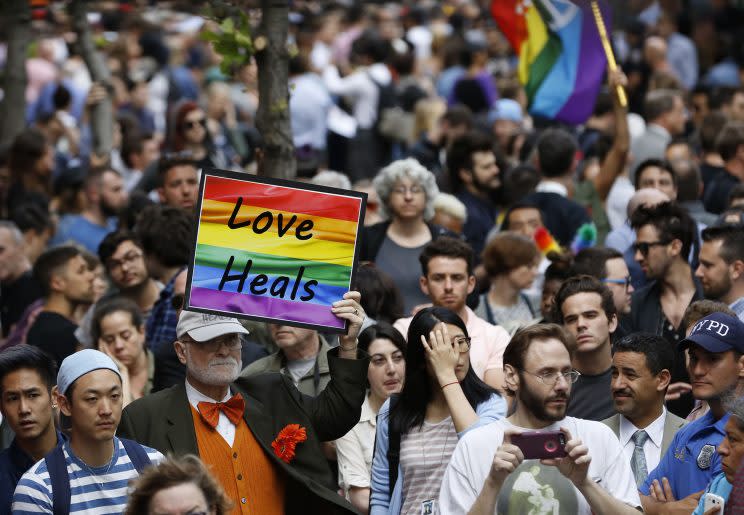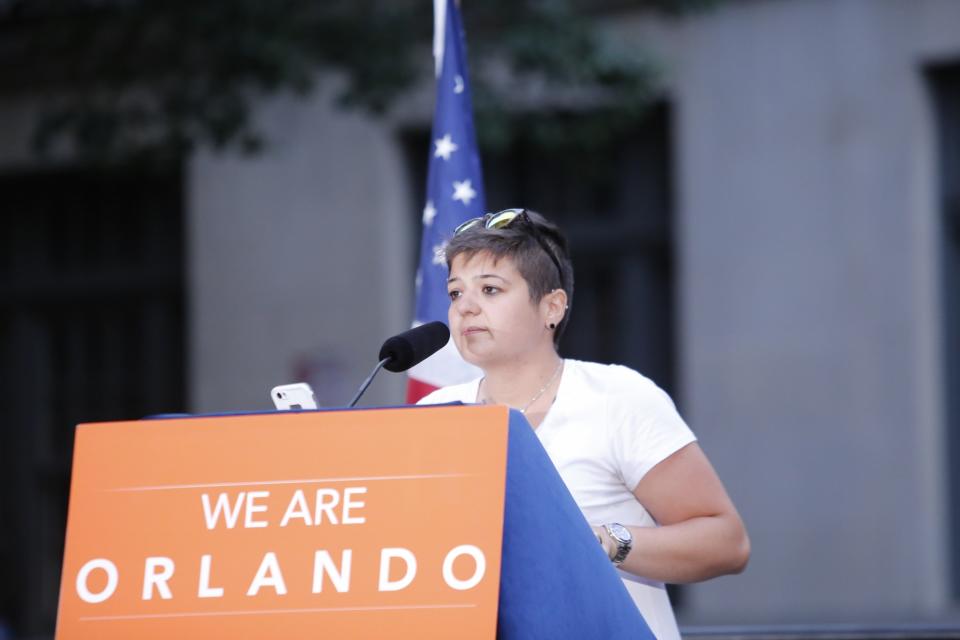After Orlando shooting, progressive Muslims push for LGBT acceptance

Less than a month after the deadliest mass shooting in U.S. history, questions linger about what role the gunman’s Muslim faith — and in particular, its opposition to homosexuality — may have played in his decision to open fire inside a gay nightclub in Orlando.
For at least two weeks after the shooting, there emerged a steady stream of reports from people who said they engaged with the shooter, Omar Mateen, on gay dating apps or talked with him at various gay clubs in Orlando including Pulse, the scene of the massacre. One man even claimed to be the married gunman’s former lover.
At this point, however, speculation about Mateen’s sexuality remains just that. And while transcripts released by the FBI last week show that he did pledge allegiance to the terrorist group ISIS during a 911 call the night of the massacre, investigators have yet to reveal any statements Mateen may have made about gay people or other explicit explanations for targeting the LGBT community.
At the same time, the absence of a clear motive has prompted unprecedented conversation about the small, relatively unknown population of LGBT Muslims and the complex challenges that accompany this dual identity.
Five years ago, Mirna Haidar arrived in the U.S. from her native Lebanon and applied for political asylum. Not long after, Haidar, who identifies as both Muslim and queer gender nonconforming, recalls that she was approached by members of the mainstream LGBT community.
“They tried to recruit me to become a member of a church,” Haidar says. “They saw I cared about my religion, my faith, and they thought, ‘You can’t be Muslim.’ So they said, ‘Let’s take you to a church.’”
Looking back, she says, “that was offensive and did more harm than good.”
Now 27, Haidar is the lead organizer and advocacy trainer for the Muslim Alliance for Sexual and Gender Diversity, or MASGD, a national organization that seeks to connect LGBTQ Muslims around the country.
Slideshow: World reacts to Orlando mass shooting >>>

Pronounced “masjid,” like the Arabic word for mosque, MASGD was established six years ago, Haidar explained, because “people who identified as queer and Muslim felt there were no spaces where they can be accepted for all the identities they had at the same time.”
To fill that void, MASGD created what is now an annual retreat for LGBTQ Muslims.
“The retreat changed my life, because you can be different and who you are at once, and you are accepted and loved,” said Haidar. Throughout the rest of the year, she explained, the organization’s 12 steering committee members — who are scattered throughout the country — “connect folks to local people that they can actually physically meet and be among and pray together if they want to.”
MASGD is on a short list of resources that exist for LGBT Muslims in the U.S. But even in a country that grants asylum to refugees fleeing violence because of their sexuality or gender identity, LGBT Muslim Americans struggle to find acceptance from within their own faith.
Exact data on LGBT asylum seekers in the U.S. is nonexistent because the Department of Homeland Security, which processes asylum requests, does not keep a record of applicants’ gender identity or sexual orientation. But one estimate, from the the international nonprofit Organization for Refuge, Asylum and Migration, suggests the number of LGBT refugees accepted by the U.S. each year might be close to 4,800 (PDF).
Though the Quran itself does not promote one specific policy on homosexuality and variant gender identities — causing the response to vary between mosques, countries and families — mainstream Muslim teachings generally reject those who identify as anything other than heterosexual.
In fact, according to the Human Rights Campaign’s Religion and Faith team, there is not a single mainstream mosque in the United States that accepts LGBT people — at least not publicly.
Within the past decade, however, groups like the Los Angeles-based Muslims for Progressive Values and Toronto’s El-Tawhid Juma Circle have emerged as part of a slow-growing movement toward a more tolerant Islam. The Human Rights Campaign estimates that there are about 10 progressive mosques in the U.S. affiliated with one of the these two main groups, which promote human rights, LGBT acceptance and gender equality.
Among the leaders of this charge is Ani Zonneveld, a Malaysian-American singer and activist who founded Muslims for Progressive Values (MPV) in 2007 after feeling increasingly stifled by the conservative male voices that have long dominated her faith.
“That, and once my eyes and heart became aware of the slew of injustices in the name of Islam,” she told Yahoo News. “It’s not possible to live my privileged life in good conscience.”
Since then, MPV has grown into a global grassroots organization that works to foster inclusive, egalitarian Muslim communities at the local level, and challenges human rights abuses justified by Sharia law at the international level.
MPV’s motto is “Be Yourself. Be Muslim.” But, Zonneveld notes, this seemingly simple maxim “is so hard to do in Muslim communities and societies” where “homophobic theology [is] taught in Islamic schools and reinforced during Friday prayer sermons.”
A key tenet of the MPV mission, Zonneveld said, is to counter these homophobic teachings, which she argues are “the antithesis of Islam,” with a more modern and accepting interpretation of the Quran.
Because the progressive mosques that preach such ideology are still so few and far between, Zonneveld teamed up with Imam Daayiee Abdullah, founder of the MECCA Institute in Washington and one of the only openly gay Imams in the U.S., to create an easily accessible YouTube lecture series on LGBT rights in Islam.
“Living a closeted life is not healthy, it leads to self-hate, depression and sometimes suicide,” Zonneveld said. “It is sad when I receive phone calls from … Muslims who have been threatened by their parents or forced into marriage to cure their homosexuality.”
Zonneveld pointed to speculation surrounding the Orlando shooter’s own sexuality plus his religious beliefs as evidence that such attitudes need “to end once and for all.”
“These homophobic religious leaders have blood on their hands,” she said. “They must be called out. We will not allow for these 49 innocent people to die in vain.”
Related slideshows:
Slideshow: Orlando continues to mourn victims of the Pulse nightclub shooting >>>
Slideshow: Obama visits families of the Orlando massacre victims >>>
Slideshow: Funerals and memorials for slain Orlando victims >>>
Slideshow: Victims of the Florida nightclub shooting >>>
Slideshow: Front-page coverage of the Orlando mass shooting >>>


